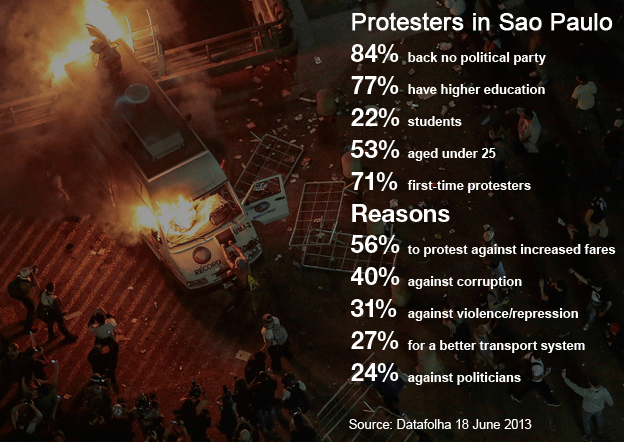 Brazilian President Dilma Rousseff has cancelled a planned trip to Japan over continuing mass anti-government protests across her country.
Brazilian President Dilma Rousseff has cancelled a planned trip to Japan over continuing mass anti-government protests across her country.
The move is an indication of the seriousness of the situation confronting her, correspondents say.
In the north-eastern city of Salvador, police fired tear gas and rubber bullets to disperse protesters ahead of an international football match there.
Big rallies are being staged in Rio de Janeiro, Brasilia and other cities.
Demonstrators in Sao Paulo earlier said they would take to the streets “to celebrate” the reversal of a public-transport fare increase announced on Wednesday.
The protests, which were originally triggered by the increase, have since grown into a much wider movement.
Demonstrators are angry at corruption and spending on next year’s World Cup.
Fenced off
 On Thursday, President Rousseff’s office announced that her trip to Japan planned for next week had been called off. Another visit to the Brazilian state of Bahia has also been put on hold.
On Thursday, President Rousseff’s office announced that her trip to Japan planned for next week had been called off. Another visit to the Brazilian state of Bahia has also been put on hold.
In a statement, the office acknowledged that the decision had been taken as a result of the continuing demonstrations.
President Rousseff earlier publicly stated that she was proud that so many people were fighting for a better country.
In Salvador on Thursday, clashes erupted when protesters tried to break through a police barrier near the stadium where a Confederations Cup match between Nigeria and Uruguay is due start later. It was not immediately clear if there were any injuries.
Meanwhile, thousands of people are marching in central Rio de Janeiro near the iconic Candelaria Church, but there have been no reports of violence, the BBC’s Julia Carneiro reports.
The city authorities earlier erected barricades around the state legislature building, which was vandalised during protests on Monday.
The state governor’s office, Guanabara Palace, and the mayor’s office had been secured by police cordons.
A number of Rio shopkeepers had put up wooden hoardings to protect the front of their businesses and some banks have done the same.
Protesters told our correspondent in Rio they would not march to the city’s Maracana stadium, which hosted a match between Spain and Tahiti.
In the capital Brasilia, big crowds gathered outside the National Congress building.
Previous Confederations Cup matches have drawn protests, with demonstrators expressing their anger at steep ticket prices and the money spent on the Confederations Cup, the 2014 World Cup and the 2016 Rio Olympics.
In the city of Fortaleza, which was hosting the Brazil v Mexico match on Wednesday, demonstrators carried banners reading: “A teacher is worth more than Neymar”, in a reference to Brazil’s star footballer.
‘Significant benefits’
On Thursday, the International Olympic Committee said it was confident the 2016 Olympics would bring major benefits to Rio de Janeiro and the country.
In a statement to the Associated Press news agency, the IOC said the Olympics would “bring significant benefits to the whole population of Rio, improving the city in terms of transport, infrastructure and social housing, as well as bringing a considerable sporting legacy for Brazil”.
“We are always fully supportive of peaceful protest and remain confident in the ability of the games as a powerful catalyst for improving the world through sport,” the statement continued.
In Sao Paulo, members of the Free Access Movement (Movimento Passe Livre) – which has been campaigning for better public transport – said they would march through the city on Thursday to celebrate the mayor’s decision to reverse a 2 June fare increase.
Mayor Fernando Haddad said the reversal was a “big sacrifice”, which meant other investments would have to be cut.
Sao Paulo and Rio are the latest two cities to reverse the fare increases after similar moves by the authorities in Cuiaba, Recife and Joao Pessoa.
The fare rollback while welcomed by many has so far failed to quell the protests, with crowds blocking main roads in Sao Paulo and Brasilia, and protesters confronting police in Rio de Janeiro state shortly after the U-turn was announced.
“This means that our politicians have begun to hear our voices. This is something that has never happened before – in a non-election year, at least,” Daniel Acosta from Sao Paulo told the BBC.
“It’s a start. What happens now, nobody knows yet, but it gives us hope,” he added.
But 18-year-old student Camila Sena said the protests had become much wider and the concession on fare prices would not change much.
“It’s not really about the price [of transport] any more,” she said while taking part in a protest in the city of Niteroi, near Rio de Janeiro, on Wednesday.
“People are so disgusted with the system, so fed up that now we’re demanding change.”
The current unrest is the biggest since 1992, when people took to the streets to demand the impeachment of then-President Fernando Collor de Mello.
BBC

Leave a Reply
You must be logged in to post a comment.